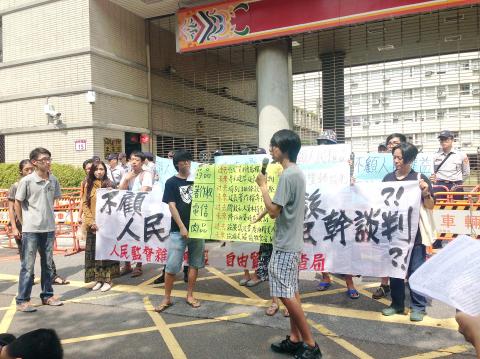The latest round of Trade and Investment Framework Agreement (TIFA) talks with the US ignores the interests of ordinary citizens, labor activists said yesterday.
Campaigners from the Taiwan Free Trade Investigation, the People’s Supervisory Alliance (人民監督雜碎聯盟) and other groups protested outside of the Ministry of Economic Affairs, the site of yesterday’s talks.
The talks were the ninth round of TIFA talks, aimed at filling out the framework, which was signed in 1994.

Photo: Huang Pei-chun, Taipei Times
The ministry earlier this week said that it would use the platform to express Taiwan’s desire to join the Tran-Pacific Partnership (TPP) being negotiated among Pacific Rim states.
Taiwan Free Trade Investigation member Lee Yuan-chun (李援軍) said that while TIFA talks were aimed at “kickstarting” Taiwan’s bid to join the TPP, the results of past free-trade accords suggest that corporations would benefit at the expense of average citizens. While activists were not opposed to trade agreements, any negotiations should be conducted from the standpoint of furthering the interests of ordinary people, he said.
The government was “railroading” the “secretive” talks through, he said, adding that a previous call for outside opinions had been perfunctory, effectively denying civic groups the opportunity to meaningfully participate.
“Proper procedures have not even been followed, much less negotiating from the standpoint of the people,” labor activist Lu Chih-hung (盧其宏) said, adding that civic groups should have been allowed to play a direct role in drafting Taiwan’s negotiation agenda to counter the influence of business lobbies.
“As long as we negotiate in this fashion, the result will be that the people are dragged along as negotiations are pulled in the direction favoring US and Taiwanese business interests,” he said.
Lu said that many past US demands had focused on requiring Taiwan to change public policy in the name of free trade, citing previous US demands to improve copyright protections and drug patents.
Acceding to US demands would harm Taiwanese consumers by widening the monopoly powers of US drug firms, he said, adding that truly “people-centric” negotiations would focus instead on lower patent fees to cut drug costs.
He also criticized US demands to relax restrictions on foreign media investments and lift the ban on imports of US pork that contain traces of ractopamine, an additive that is banned in Taiwan.
Acceding to the demands would encourage monopolization and create health risks, he said, adding that there would be no way for consumers to completely avoid pork containing ractopamine if the ban were lifted.

Taiwanese can file complaints with the Tourism Administration to report travel agencies if their activities caused termination of a person’s citizenship, Mainland Affairs Council Minister Chiu Chui-cheng (邱垂正) said yesterday, after a podcaster highlighted a case in which a person’s citizenship was canceled for receiving a single-use Chinese passport to enter Russia. The council is aware of incidents in which people who signed up through Chinese travel agencies for tours of Russia were told they could obtain Russian visas and fast-track border clearance, Chiu told reporters on the sidelines of an event in Taipei. However, the travel agencies actually applied

Japanese footwear brand Onitsuka Tiger today issued a public apology and said it has suspended an employee amid allegations that the staff member discriminated against a Vietnamese customer at its Taipei 101 store. Posting on the social media platform Threads yesterday, a user said that an employee at the store said that “those shoes are very expensive” when her friend, who is a migrant worker from Vietnam, asked for assistance. The employee then ignored her until she asked again, to which she replied: "We don't have a size 37." The post had amassed nearly 26,000 likes and 916 comments as of this

New measures aimed at making Taiwan more attractive to foreign professionals came into effect this month, the National Development Council said yesterday. Among the changes, international students at Taiwanese universities would be able to work in Taiwan without a work permit in the two years after they graduate, explainer materials provided by the council said. In addition, foreign nationals who graduated from one of the world’s top 200 universities within the past five years can also apply for a two-year open work permit. Previously, those graduates would have needed to apply for a work permit using point-based criteria or have a Taiwanese company

The Shilin District Prosecutors’ Office yesterday indicted two Taiwanese and issued a wanted notice for Pete Liu (劉作虎), founder of Shenzhen-based smartphone manufacturer OnePlus Technology Co (萬普拉斯科技), for allegedly contravening the Act Governing Relations Between the People of the Taiwan Area and the Mainland Area (臺灣地區與大陸地區人民關係條例) by poaching 70 engineers in Taiwan. Liu allegedly traveled to Taiwan at the end of 2014 and met with a Taiwanese man surnamed Lin (林) to discuss establishing a mobile software research and development (R&D) team in Taiwan, prosecutors said. Without approval from the government, Lin, following Liu’s instructions, recruited more than 70 software